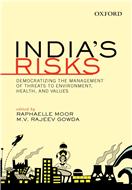- Published 01/06/14

A prospective superpower, India is still grappling with a host of risks that threaten to hamper its progress. These range from environmental threats caused by GM crops and pollution; dangers to health from HIV/AIDS and maternal mortality; safety concerns about natural hazards, nuclear power, and industrial disasters; and challenges to livelihoods and values.
Some of the issues that this volume explores are: what counts as an ‘acceptable’ risk, and who decides? How should divergent perceptions of risks be reconciled? And, where is the line between science and politics? Advocating a more multidimensional approach to managing risks, the authors challenge many of the dominant perspectives in India.
The field of risk research, which has emerged over the last 40 years in the West, has been relatively unexplored in India. In an effort to bridge this gap, this volume brings together Indian and Western scholars and practitioners across the fields of psychology, anthropology, law, politics, sociology, public health, philosophy, science, and architecture, who offer insights on the theory of risk, lessons from the West, and the realities of risk in India.
STEPS member Erik Millstone has contributed a chapter entitled: “Science and Politics in Indian GM Crop Regulation: A U-turn Down a Blind Alley”.
This book is linked to our UKIERI-funded project on Risk, uncertainty and technology in India.
Reviews
One of the great dramas of current knowledge is the way activism and scholarships are combining to question the stereotypes and the sacred cows of our time. One such animal in India is science and India’s Risks produces a scorching but playful critique of risk and the contemporary idea of risk in science and politics in India. Ranging over studies of POSCO, Kundankulam, Fukushima and BT Brinjal, it shows the differences in the construction of technical risk assessment and public debate on safety and risk. This volume is a major contribution to the democratization of science and should be welcomed and celebrated for its sense of nuance, its idea of debate and its quiet pursuit of justice for the vulnerable and voiceless. Professor Shiv Visvanathan, School of Government and Public Policy, O.P. Jindal Global University
India is visited periodically by disasters, but in sharp contrast to other fields, disaster management in India has remained the preserve of government bureaucracies with little time or resources for long term research. This volume’s thought provoking ideas, methods and approaches, has the potential to forge an entirely new and urgently needed research field. S. Ravi Rajan, University of California, Santa Cruz, and TERI University, New Delhi
Risk is central to modern societies and their politics. Yet perceptions and policies differ depending on context. For the first time, India at Risk offers a fascinating exploration of these issues, mixing conceptual insights with empirical cases from a wide range of settings, and covering a huge array of issues and debates. This is a ‘must read’ book for anyone wanting a guide to responding to risk in India and beyond, whether students, field practitioners or policymakers. Highly recommended. Professor Ian Scoones, co-director, STEPS Centre, Institute of Development Studies, University of Sussex, UK